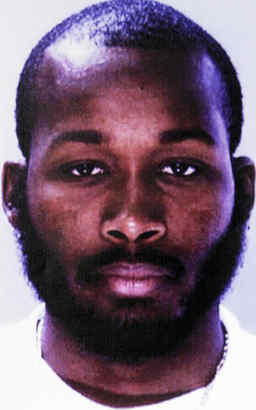
Rasheed Scrugs |
|
Jury selection to start in officer's death
by Joseph A. Slobodzian
Philadelphia Inquirer
October 4, 2010
For the fourth time in 10 months, Philadelphia police are steeling themselves to relive the murder of one of their own.
On Monday, prosecution and defense lawyers will begin selecting a Philadelphia Common Pleas Court jury for the trial of the accused shooter of Officer John Pawlowski, 25, the last city police officer killed in the line of duty, on Feb. 13, 2009, after just five years on the force.
The life of Rasheed Scrugs, 35, is on the line. A parolee from West Philadelphia, he has a decade-long record of arrests for theft, robbery, and gun crimes.
Scrugs is accused of initiating the fatal shoot-out with police at Broad Street and Olney Avenue, outside the SEPTA transit station. They were responding to a 911 call from a cabdriver who said Scrugs was threatening him.
Pawlowski got off one shot at Scrugs but was hit in the upper chest by a bullet that passed over the top of his bulletproof vest.
As in two of the last three trials of men who killed police, the District Attorney's Office is seeking the death penalty if the jury's verdict is first-degree murder. |
.
In a first-degree murder case - where premeditation and malicious intent are key elements to be proved - Scrugs' trial may hinge on the threat that witnesses say he uttered to the cabbie: "If you call the cops, I'll shoot you and the cops."
Pawlowski's killing occurred during one of the Police Department's darkest periods: seven officers killed in the line of duty, beginning with Officer Gary F. Skerski on May 8, 2006, another in 2007, four in 2008, and Pawlowski on Feb. 13, 2009.
His death touched off a storm of emotion in Philadelphia's law enforcement community, still mourning the death four months earlier of Sgt. Timothy Simpson, whose car was hit by a drunken driver fleeing police.
"A career criminal." "Cold-blooded killer." "Unsalvageable." Those were among the epithets Police Commissioner Charles H. Ramsey spat out to reporters the night Pawlowski was shot.
A month later, Municipal Court Judge Patrick Dugan ordered Scrugs held for trial on murder, robbery, and gun charges, calling him "a domestic urban terrorist" who "ambushed a police officer who was responding to a citizen calling 911 for help."
Also compelling was Pawlowski's personal story - his recent marriage to his childhood sweetheart, Kim, who was five months pregnant when he was killed. Their son, John III, turned 1 on June 11. The dead officer was the son of a retired police lieutenant and brother of a police corporal.
Much, if not all, of this week will be spent picking 12 jurors and several alternates who must be willing to consider imposing death by lethal injection if the evidence warrants, or life in prison without parole if it does not.
The prosecutors are Assistant District Attorneys Edward McCann and Jacqueline Juliano Coelho.
McCann, former chief of the district attorney's homicide unit, is now deputy in charge of the entire criminal division. Coelho is a veteran homicide prosecutor who last year successfully prosecuted five North Philadelphia teenagers in the death of Starbucks manager Sean Patrick Conroy in a 2008 attack in a Center City subway concourse.
Two veteran Philadelphia defense lawyers are representing Scrugs. Lee Mandell, who defended one of the teens in the Conroy case, will handle the trial, and David Rudenstein will be "mitigation counsel" should the case reach the death-penalty issue.
Coincidentally, the judge in the Scrugs case, Renee Cardwell Hughes, handled this summer's trial of two men for the murder of Officer Stephen Liczbinski.
That jury convicted Eric DeShann Floyd and Levon T. Warner of first-degree murder, but it deadlocked on the death penalty. Under state law, Floyd and Warner were automatically sentenced to life in prison without parole.
Floyd and Warner's trial turned into a judicial marathon: four weeks of jury selection and three weeks of testimony before the July 28 guilty verdicts; two weeks more of testimony and deliberations before the men were sentenced to life in prison.
Mandell and McCann say they doubt Scrugs' trial will take as long. In fact, they say, picking a jury could take longer than the testimony.
One reason is that the Pawlowski trial has only one defendant. And unlike Floyd and Warner, Scrugs - shot and critically wounded in the confrontation - did not make a statement to police.
Still, the possibility of a death sentence has a way of complicating a trial, and Scrugs' attorneys were fighting it as late as Wednesday.
Rudenstein and Mandell, with help from death-penalty expert Marc A. Bookman, asked Judge Hughes to compel prosecutors to offer Scrugs a deal: plead guilty to first-degree murder, waive all appeal rights, and get a sentence of life in prison with no chance of parole.
The District Attorney's Office has made such eleventh-hour offers before in death-penalty cases. The prosecutors' refusal to do so with Scrugs was an "abuse of discretion," Rudenstein argued.
Not so, McCann said, maintaining that there was no abuse precisely because the district attorney's decision to seek the death penalty is discretionary.
Hughes denied the defense request, as well as one for a year's delay in the start of trial. Rudenstein, she said, had not produced any evidence that the District Attorney's Office unfairly decided to seek the death penalty in Scrugs' case, or to refuse to offer Scrugs a plea deal.
"The trial," Hughes said, "starts Monday."
http://www.philly.com/inquirer/local/pa/20101004_Jury_selection_to_start_in_officer_s_death.html |